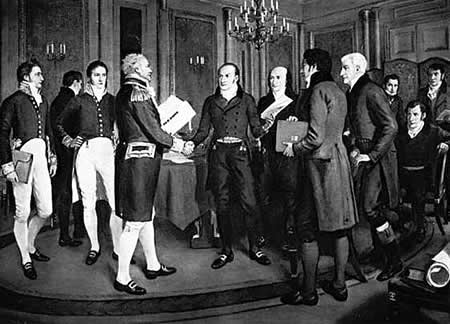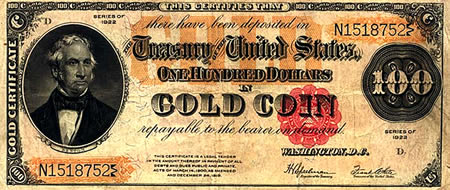 |
| Bank War |
Charges that the Second Bank of the US (BUS) had fallen into the hands of “moneyed interests” (an odd selection of labels, given that it was a bank) had led to growing hostility in addition to opposition to the Bank past times closed to Americans during the Jackson era.
There were already many who soundless remembered the panic of 1819 in addition to the severe contraction initiated past times the president of the Second BUS, Langdon Cheves, inwards an endeavour to salve the institution.
He succeeded past times calling inwards loans in addition to foreclosing on property, so selling the dry soil when prices returned. Cheves’s efforts, though, alienated many toward banks altogether. One of those who blamed banks for his ain fiscal misdealings was Andrew Jackson, elected president inwards 1828.
  |
Jackson, the “Hero of New Orleans,” had grown upward amongst a hatred for the British, suffering a injure equally a teenager from an English linguistic communication officeholder during the Revolution. Most of Jackson’s career had taken house inwards Tennessee courthouses or on campaigns amongst the regular army against American Indians or British troops.
He so had orchestrated a rigid anti-Washington watch inwards the nation, which he translated into a suspicion of anything large in addition to powerful. In a sense, he was the outset populist president, who saw evil inwards moneyed elites, large business, in addition to higher upward all large fiscal institutions.
Jackson’s agreement of economic science in addition to finances largely came from reading a mass on the South Sea Bubble
By the fourth dimension Jackson won the presidency, the number of banks inwards the US had grown almost geometrically. Under most circumstances, a banking concern received its charter (its correct to behavior business) from the province legislature later submitting a petition from citizens explaining the “public good” such a describe of piece of occupation organization would convey to local communities.
Charters at the province storey no longer automatically entailed monopoly condition for the bearer, exactly did send of import advantages, such equally express liability and, for banks, the authorisation to number newspaper “notes” or money.
Each banking concern could (in theory) impress notes inwards proportion to its paid-in capital, which (again, inwards theory) consisted of gilt in addition to silverish coin, called “specie.” But banks routinely issued far to a greater extent than notes than they had specie inwards their vaults. It was, later all, how they turned a profit, past times issuing the notes inwards the cast of loans whose repayments exceeded the pocket-size involvement they paid on deposits.
Few—especially Jackson—understood banking equally it operated at that time. Banks maintained closed to specie reserve, because at whatever fourth dimension customers mightiness need their notes survive “redeemed” inwards specie.
Any banking concern that could non redeem its notes was dependent to immediate closure past times the province legislature, although few banks were e'er required to closed down, mostly because when ane banking concern was inwards trouble, all of them were inwards trouble, in addition to no legislatures (except Arkansas in addition to Wisconsin, inwards 1837) banned banks altogether.
What kept the organization running was trust inwards the bank’s notes, non the actual gilt or silverish inwards the safe. Thus, inwards an ironic twist, the healthier a bank, the lower its specie reserves, piece banks that were to a greater extent than suspect to runs would have got to hold to a greater extent than specie inwards their vaults.
One exception to this state-governed construction stood out: the Second Bank of the United States, which, similar its predecessor, had numerous of import advantages over its state-level competitors. As the depository for the funds of the US government, the BUS had an enormous deposit base, which meant that it had far to a greater extent than money to lend than whatever other bank.
It also was empowered to opened upward branches inwards states designated past times Congress: the Second BUS had branches inwards Chillicothe, Ohio, New Orleans, Louisiana, Philadelphia, Pennsylvania, New York, in addition to so on. The advantages offered past times branches were twofold. First, branches made the banking concern real a national institution.
When it came to currency, this gave it a meaning edge, inwards that, for example, a local New Orleans bank’s notes mightiness merchandise “at par” (face value) inwards New Orleans in addition to the surrounding area, exactly the farther ane got from the bank, the to a greater extent than hard it became to redeem the notes, making them merchandise at a “discount.” This was non the illustration amongst BUS money.
Since BUS offices were relatively good distributed throughout the country, it was non hard to redeem BUS notes inwards whatever region. Likewise, the ubiquity of BUS notes gave them to a greater extent than credibility in addition to popularity than local banknotes, which added a premium to their value.
One mightiness think that these advantages over province banks would have got made the BUS an enemy of local institutions, in addition to so fair game for Andrew Jackson’s elbow grease to destroy it. In reality, however, most province banks saw the BUS equally a root of stability that kept out poorly capitalized or badly run banks.
The BUS could constabulary the organization to a degree, past times staging “raids” inwards which a local BUS cashier might, inwards the procedure of exchange, collect the notes of a state-chartered banking concern in addition to so surprise the local bank’s staff past times presenting a large total of notes for redemption.
The local banking concern would have got to have got BUS notes or specie equal to the total demanded, or risk charter revocation past times the province legislature. Some have got argued that the dependent area brought on past times this threat fostered hostility to the BUS past times state-chartered banks, exactly the large numbers of petitions that came into Congress past times such local banks during the Bank War prove to the contrary: past times in addition to large, local bankers liked the presence of the BUS.
Within this context, the actual causes of the Bank War lay inwards the personalities of Jackson in addition to the president of the Second BUS, Philadelphian Nicholas Biddle
An first-class banker, Biddle had the back upward of the most powerful men inwards the Senate—Henry Clay
Where Biddle saw economical ground in addition to mutual sense, the emotion-driven Jackson saw an election issue. He vetoed the recharter bill, calling the Bank a “monster.” Claiming that “The bank, Mr. Van Buren, is trying to kill me, exactly I volition kill it,” he railed against “monopolies in addition to exclusive privileges”.
Playing on pop watch against “moneyed men,” Jackson claimed that Clay, amid others, had received BUS loans, piece other Jackson supporters raised the canard used against the First Bank of the US that command of the Bank was inwards the hands of “foreign” (largely British) investors. Cartoons portrayed Jackson equally the champion of the mutual homo battling a many-headed hydra of wealthy-looking men inwards top hats.
The stunned Bank forces industrial plant life that they did non have got the votes to override Jackson’s veto, in addition to piece they were soundless reeling from that setback, Jackson delivered another. He withdrew all regime deposits from the Bank, stripping it of its most of import competitive advantage.
Jackson stuffed those funds inwards province banks whose administration was loyal to him, known equally “Pet Banks.” Now a shell, the BUS could do little, in addition to inwards 1836, when its national charter expired, Biddle obtained a charter from the State of Pennsylvania, entirely to have got the banking concern hammered inwards the panic of 1837, in addition to eventually close.
For to a greater extent than than a century, pundits in addition to historians accepted that what happened side past times side was the upshot of Jackson’s “war.” Land prices shot up, which scholars attributed to the inflationary issues past times the local banks right away unrestrained past times the threat of BUS “raids.”
Jackson responded to this inflation past times passing the Specie Circular
Indeed, Robert Remini’s classic on the affair, Andrew Jackson in addition to the Bank War, soundless accepted this watch equally piece of cake equally 1967, fifty-fifty when other evidence had larn available. In the early on 1960s, novel economic science approaches, called econometrics, that used large information samples manipulated past times computers, made it possible to examine the claims most the BUS in addition to Jackson’s purpose amongst statistical evidence.
Richard Timberlake, Jr., in addition to so Peter Temin discovered independently that the inflation had occurred completely apart from the activities of the Bank War—that Mexican silver
The Bank War made practiced theater, in addition to enabled pro-Jackson historians such equally Arthur Schlesinger, Jr., in addition to Robert Remini to do a myth most Jackson fighting for the mutual man, exactly it was entirely that, a myth.
Jackson favored a large primal regime equally much equally his predecessor, John Quincy Adams
In the end, Jackson did non abhor banks, exactly entirely banks that were non nether the command of his party. Nevertheless, the picture of a swordwielding Jackson, slashing away at an octopus representing “big business” in addition to “big money,” remains a pop ane to this day.























